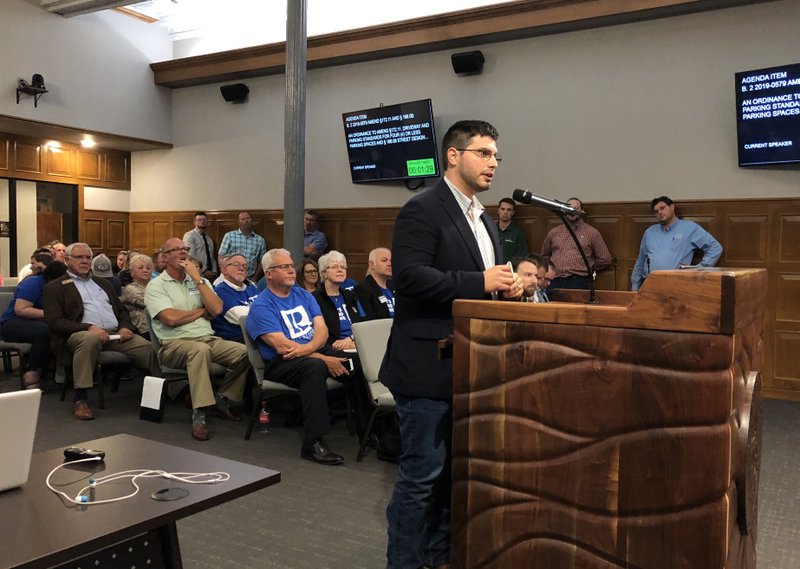"Hey, I found your nose. It was in my business again."
-- Internet meme
When is municipal zoning, the kind that sets parameters for how a particular property can be developed, a critical matter for the health, welfare and safety of a community, and when exactly does it become meddling?
City Council members and planners in Fayetteville recently were offered a lesson -- it's unknown whether it will be absorbed -- on the subject. Specifically at issue was how wide the city would let homebuilders construct driveways in certain types of neighborhoods. More generally and beyond the walls of the council chambers, the matter evolved in a deeper community dispute: Just how much are real estate agents, builders and the public willing to let politicians dictate what new homes should look like and how they should function?
The proposal originated, or at least emerged, from the minds of city planners as a way to promote what's called traditional town form, a style of residential and commercial development that focuses more attention to how the community feels to walkers, bikers (and, we suppose, scooterers) than how quickly it moves automobiles from point A to point B. It's a development style inspired by modern recognition that development centered on automobiles produces sprawl, discourages neighbor-to-neighbor connections, and creates cities but not necessarily strong communities.
That viewpoint has merit. A town's architecture, street designs, sidewalk development, parks, etc., all combine to influence how people feel in their day-to-day interactions. A street, say College Avenue, can add stress to one's life by how it's developed. Likewise, the way neighborhoods develop can either make people feel like they're part of a community or silo them off.
Nearly two years ago, in a Planning Commission retreat, Commissioner Matt Hoffman spoke of the value of reducing road widths and setting city code changes on driveways to promote side-load garages rather than front-facing ones so ubiquitous in many neighborhoods. Reducing the number of garage doors lining a street will make for a more pleasing neighborhood experience, he said at the time.
"This is about offering different incentives to get a development pattern going," he said.
Now flash forward to 2019. Hoffman introduced a proposed ordinance that in certain conditions would mandate stricter limits on driveway widths. The goal was to promote house construction in some zoning classifications with garages farther away from streets, entered from the side or back of the houses.
What’s the point?
A plan to limit driveway widths in some residential subdivision developments exposed a gap between city planners and the folks doing the real-world development of property in Fayetteville.
The result was several City Council meetings in which people involved in real estate sales and development turned out in force, declaring the city was going too far in dictating housing designs. The free market, these folks said, determines what does and doesn't sell, not political leaders.
It didn't help that the proponents of the changes did little to marshal support in the community for their ideas, at least within the development community. Their approach smacked a bit of, "We'll tell you your opinion when we want it." In a town where Mayor Lioneld Jordan's administration has promoted a notion that city government's direction is driven at the grassroots level, the track of this proposal felt very top down from the council.
In the end last week, the vote on the City Council represented the division within the community at large. Four members (Sarah Marsh, Matthew Petty, Sloan Scroggin and Kyle Smith) voted for it, and four others (Sonia Gutierrez, Mark Kinion, Sarah Bunch and Teresa Turk) voted against it. Mayor Jordan could have saved the day for those wanting the change, but he declined his right to cast a deciding vote. That meant the proposal failed.
"As a sitting mayor, I cannot afford to put this city in jeopardy of lawsuits," Jordan said. "In principle, I agree. But I have concerns about the legal issues."
Indeed, it's been a while since the Fayetteville City Council's actions have produced so many lawyers billing hours to sit through long discussions in the council chambers. But the driveway proposal clearly uncorked feelings that city leadership was going too far. Cries of "property rights" were placed front and center, with threats of lawsuits if the city attempted to get deeper into the business of how private property can be developed.
Advocates of property rights had a rather new arrow in their
quiver: A law introduced by Sen. Bart Hester of Cave Springs after Springdale city officials discussed -- just talked about -- a possible regulation banning the use of vinyl siding by home builders. The Springdale idea was dropped quickly, but the Legislature passed the bill anyway. It prohibits municipalities and counties from regulating home construction appearance such as size, placement and architectural styling of windows, doors and garages.
Would this driveway width ordinance have done that? Several attorneys and development professionals offered promises of litigation if the city approved the limitations. We don't offer a legal opinion, but generally agree cities ought not be in the business of dictating aesthetics of home developments. Cities have certain rights and responsibilities to make sure development is compatible, but property owners have rights, too. The mass resistance to this driveway ordinance suggests it was a bridge too far.
Undoubtedly there are times a city might want to be a so-called test case in the courts when an issue is important enough, but elected leaders should recognize litigation is a extraordinarily costly and inefficient way to effect change.
In Fayetteville, where there's often plenty of talk about unity and collaboration, influencing change will always be a better choice than imposing it.
Commentary on 11/10/2019

